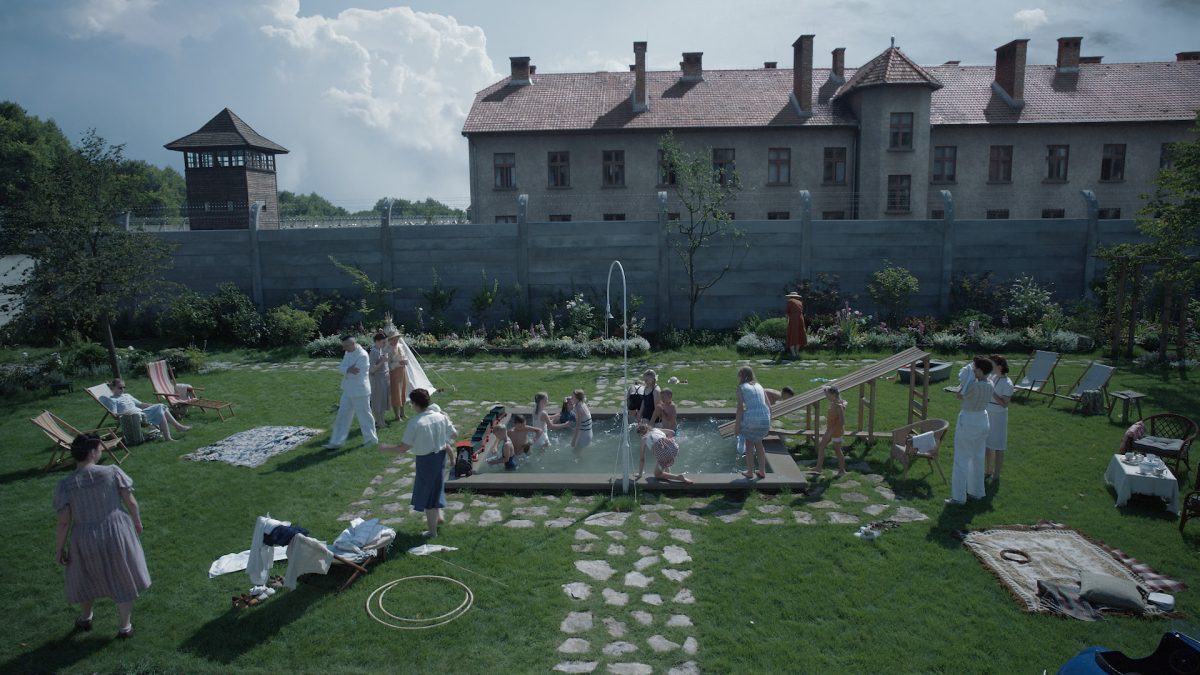The lights dim in the theater as “The Zone of Interest” is about to play. The audience puts away their phones, expecting an opening shot that might give them a hint of what’s to come. But all they get is a black screen and an overwhelming overture that nullifies their senses. The endless melancholic hum that resembles an orchestral tuning draws the viewers in, making them wait for the opening shot. Some fidget in their seats, others think that the movie theater has made an error. They try to find glimpses of characters, dialogue and recognizable settings. But it doesn’t come. For five whole minutes. Throughout the course of the film, audience members realize that this is a film that not only asks you to watch passively — but asks you to listen.
Jonathan Glazer’s latest “The Zone of Interest” is an adaptation of English novelist Martin Amis’ novel of the same name. The film received universal acclaim, winning the Grand Prix prize in the 76th Cannes Film Festival and receiving five Oscar nominations. It depicts the life of Rudolf Höss (Christian Friedel) — a German SS officer who was the longest-serving commandant of Auschwitz — and his family who live next to the camp. Höss was responsible for implementing poison gas chambers in the camp, which would cause nearly 1 million deaths of prisoners over the course of four years.
“The Zone of Interest” is an uncomfortable film. Surprisingly, the camera never directly captures the atrocities of the Holocaust. We barely see any kind of violence occur on screen. Viewers spend more time watching Rudolf Höss and his family go on with their mundane everyday lives than witnessing the horrors beyond the wall. Some scenes, like when Höss and his raucous wife talk about being transferred to a new location feel like a soap opera. The nonchalant attitude of Hedwig Höss (Sandra Huller) and Rudolf disgusts the audience, emphasizing the inhumane horror the Nazis committed against its war prisoners.
But what is so utterly discomforting about this film lies in the fact that this domestic drama is happening only a few yards away from the walls of Auschwitz. One can only grasp hints of the mass murder through the sound of ever-burning crematoriums and periodic gunshots. The haunting sound design ensures the audience members are constantly aware of the mass murder being committed within earshot. By constructing a horrific landscape of the concentration camp, using sound instead of image, Glazer illustrates how violence is ignored and forgotten over time.
Glazer’s picture not only criticizes the cruel Nazi government, but questions the mundanity of violence as well. As the audience relies on their initial instinct to focus on the visual aspect of the film, they soon begin to get accustomed to the sound of the concentration camp. The cacophony of gunshots, screams and forced labor is silenced by the banal family drama of the Höss family.
It is only when the film cuts to the smoke from the crematorium chimneys that we get reminded of the horrific acts being committed not so far away. Glazer points out our ignorance toward brutality by creating a cinematic experience that shows how a viewer can get used to violence.
“The Zone of Interest” is an experimental film that is not for the faint of heart. The visual effects are disturbingly powerful, startling the audience with a sudden close-up or even painting the screen entirely red for what feels like a whole minute. The only time in the film where we see the inner workings of Auschwitz is through thermal photography. The sound design by Johnnie Burn creates not only the soundscape of the concentration camp, but also forges the scale of the violence inflicted on the prisoners.
This film is by no means a traditional Holocaust narrative. There are no bodies, no uprisings and no executions on screen. The camera is strictly pointed at the German Höss family. But it is only in the final sequence, when the sound of the concentration camp falls silent, that the audience realizes what they have been neglecting for the runtime of the film. Though “The Zone of Interest” is a film that might be too difficult for the Academy to digest, it is definitely worth experiencing.
Contact Tony Jaeyeong Jeong at [email protected].


























































































































































